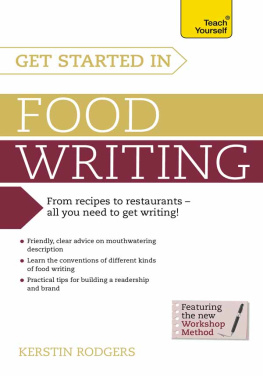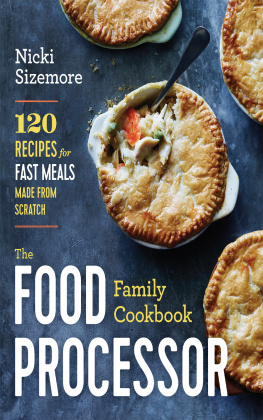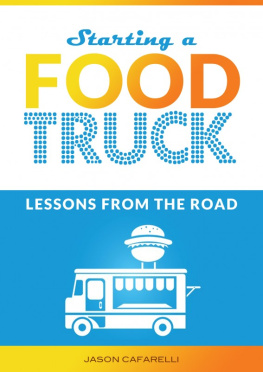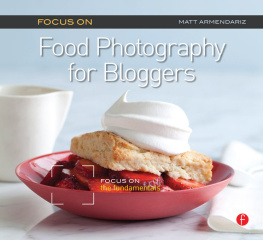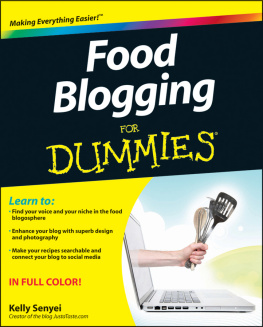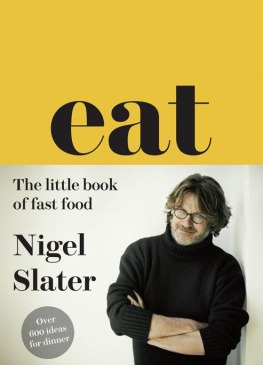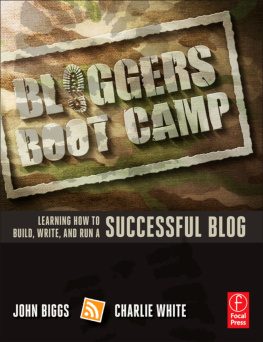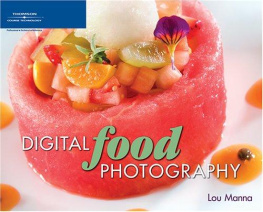Get Started in Food Writing
Kerstin Rodgers
Contents
About the author
Kerstin Rodgers is a chef, author, blogger and photographer. In 2008 she started her award-winning blog msmarmitelover.com under her pseudonym msmarmitelover. In 2009 she started her supper club The Underground Restaurant, which launched an underground restaurant/supper club/pop-up movement around the UK and Europe. Kerstin runs a site called Find a Supper Club (supperclubfangroup.ning.com) where people can find their local supper club.
As a photographer, she worked for the NME, record companies, Cosmopolitan, Elle, The Guardian and The Observer. She has also had exhibitions of her photography in Paris and London.
Kerstin has won awards: the Guild of Food Writers blog of the year in 2013 and the Fortnum & Mason online food writer of the year 2014. In 2011 she was named as one of Londons 1,000 most influential people by the Evening Standard.
She has written three successful cookbooks: Supper Club: Recipes and Notes from the Underground Restaurant (HarperCollins 2011), MsMarmitelovers Secret Tea Party (Square Peg, 2014) and V is for Vegan (Quadrille, 2015).
How to use this book
The text is accompanied by a variety of boxes and exercises to help you develop and hone your food writing. These are indicated by the following icons:
The Key idea box will help you focus on a core learning point.
Words of advice and inspiration from cookery writers, bloggers and others.
A short exercise to get you thinking and experimenting.
An exercise that sets you a specific writing assignment.
An exercise that asks you to revisit, reassess and/or redo a piece of work.
A Workshop a longer exercise or project.
Why write about food?
What is it about food that so many people including you, the purchaser of this book, want to write about it? Lets look around at what is happening in food.
Its the fashion!
Food is the new rockn roll. Currently we are all obsessed with food: TV seems to show nothing else but food programmes and celebrity chefs. Its so popular, youd think cooking had just been invented.
The reasons for this are multiple: while television reflects the zeitgeist, it must be admitted that food programming is cheap to make, similar to reality TV. Many of the food shows are jeopardy-based, which is TV lingo for turning cooking into a competition, a game show. Teaching people about food is no longer enough. We are encouraged to aspire to our own 15 minutes of food fame.
Its a whole other debate as to whether anybody is actually cooking more as a result of all this food programming but yes, gastronomy is all around us. In fact, there is even a new word for it, we are no longer eaters or cooks but foodies.
People who have never worked or trained as cooks or worked in restaurants soap actresses (Nadia Sawalha), TV presenters (Davina McCall), film stars (Gwyneth Paltrow, Alicia Silverstone), musicians (Cookin with Coolio), musicians kids (Mary McCartney, Daisy Lowe), models (Sophie Dahl, Lorraine Pascale, Daisy Lowe, Jasmine and Melissa Hemsley, Ella Woodward), wives (Tana Ramsay) and fashion experts (Gok Wan) are now making food programmes, writing recipe books and newspaper columns on food.
And if they are not cooking and writing about it, they are talking about how not to eat food: the diet industry is huge. (This is a large and profitable sector so dont neglect that as a possible angle for your food writing. We will go into that further in .)
So its no exaggeration to note that the last decade has been food-obsessed and it remains important to document that trend. Chefs are the new rock stars, restaurants are the places to go. My teenage daughter would rather go to a restaurant than go clubbing. As a food entrepreneur, I started night markets: farmers markets held in the evening for young people to enjoy prepared dishes, shop for gourmet and artisan food, and listen to live music. My first one, which I called Tongue in Cheek a food rave was held in my two-bedroomed apartment and in the garden. Starting after work on a Friday night: to my surprise, hundreds of young people queued for hours to get in. A very different audience to the married couples, parents and grandparents that go to farmers markets on Sunday mornings.
When I was a teenager, I dreamed of writing and photographing for the New Musical Express. I spent my income on going to gigs, buying albums and hanging out in trendy bars. I hid the fact that I was interested in food: it wasnt hip. My handwritten recipe notebooks, complete with watercolours and drawings, were something only shamefully to be admitted to. Today young women are more likely to want to start a cupcake business.
Even children are starting food blogs: for example, nine-year-old Martha Payne whose blog, neverseconds.blogspot.com, documented her Scottish school dinners as well as what kids in other countries are eating for lunch. She was so successful she won awards and got a book deal on the back of her blog. Other youngsters are entering cooking competitions such as Junior MasterChef or hoping to go to cookery school. A couple of generations ago, catering college was where academic failures ended up. One chef in Leeds told me he was always in trouble as a teenager; finally the judge gave him a choice: a young offenders institution or cooking school. He chose the latter and, after training under Marco Pierre White, now has his own restaurant.
So how did this happen in a culture where one of the worst things you can be is overweight? As a vice, gluttony crowns the top seven deadly sins chart while the other six (pride, lust and greed particularly) are positively encouraged by capitalist society.
Is our food obsession the shadow side of the desire to be thin? We are conflicted: while overeating is frowned upon in Western culture, food is for the most part plentiful and ubiquitous. Food is cheaper than it used to be. The high street is no longer full of butchers, fishmongers and bakeries but cooked food outlets. Nowadays we want the finished object, fast food, the easy meal. More people live alone, meaning that its an expensive effort to cook for yourself and almost cheaper to live on takeaways.
Food is now voyeurism, and food writing forms part of that. We eat with our eyes, almost a displacement activity. We want to read about it, see pictures, share Instagrams, tweet about our meals. In fact, a common criticism of Twitter one hears is: It is people tweeting about what they had for breakfast like thats a bad thing. Its entertainment. Its no coincidence that two of the most successful TV programmes of recent years are the globally imitated

